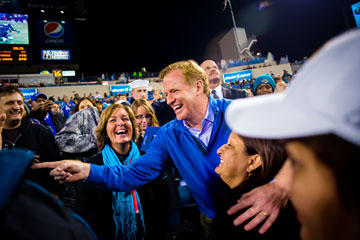
Goodell mingles with fans in Jacksonville, Fla. The Senator's son has a politician's touch
(3 of 9)
Put another way: Why, Roger Goodell, are you messing with our game? Whether it's because he has prompted rule tweaks, docked someone from your favorite team, locked out the players in a labor dispute last season or the referees this season, if you're a football fan, Goodell has probably ticked you off. "Anything that gets in the way of football," the commissioner acknowledges, "you get pushback."
Football is brutal by definition; every play is a synchronized multivehicle crash. On a single Sunday in mid-November, for example, three quarterbacks--Michael Vick of the Philadelphia Eagles, Jay Cutler of the Chicago Bears and Alex Smith of the San Francisco 49ers--suffered concussions. "I just think we're trying to take some things out of the game that are staples of football," says Jets safety Yeremiah Bell. "Football is football. It's contact. I mean, how much safety is there?"
Saints quarterback Drew Brees, one of the most popular and marketable players in the NFL, says he's "disappointed" in Goodell. "Really a lack of accountability from the top down," Brees says. "Also, I feel like, in large part, this bounty scandal, so to speak, is a big facade and a way to cover up the shortcomings of the league and the commissioner with regards to player health and safety over the last three years." After all, can a commissioner who has proposed a longer regular season--which would mean more head banging--and put a violent game in the hands of underqualified scab referees really claim to care about keeping players safe?
The final verdict on the player-safety debate may be beyond Goodell's control. The NFL is being sued by some 4,000 ex-players, plus nearly 1,500 of their spouses and children, who allege that the league "deliberately ignored and actively concealed" information about concussions for decades. In mid-November, ESPN and PBS reported that in the 1990s and 2000s, the NFL's disability board for retired players concluded that repetitive head trauma was responsible for brain injuries to at least three ex-players and awarded them disability payments. Until 2009, though, the NFL publicly denied that concussions cause chronic brain damage. (The NFL says the decisions of the disability board, which consists of representatives from the NFL and the players' union, are independent of the league.) The suit's very existence has brought more scrutiny. "This case could lead to the downfall of the NFL as we know it today," says Darren Heitner, a sports lawyer in South Florida.
The NFL is trying to get the suit tossed out of court and denies deliberately causing harm. But no one can deny that a spate of football players who either suffered from symptoms of depression and dementia later in their lives or killed themselves have been diagnosed with CTE. If football doesn't become a safer game, more parents will likely prevent their kids--the NFL's future players and fans--from playing. And why shouldn't they, given studies like the one published in Neurology in September showing that ex--NFL players were four times as likely as nonplayers to die from Alzheimer's or ALS? Fears are already trickling down to the youth level: according to the Sports & Fitness Industry Association, the number of kids ages 6 to 12 participating in tackle football was down 35% from 2007 to 2011.
